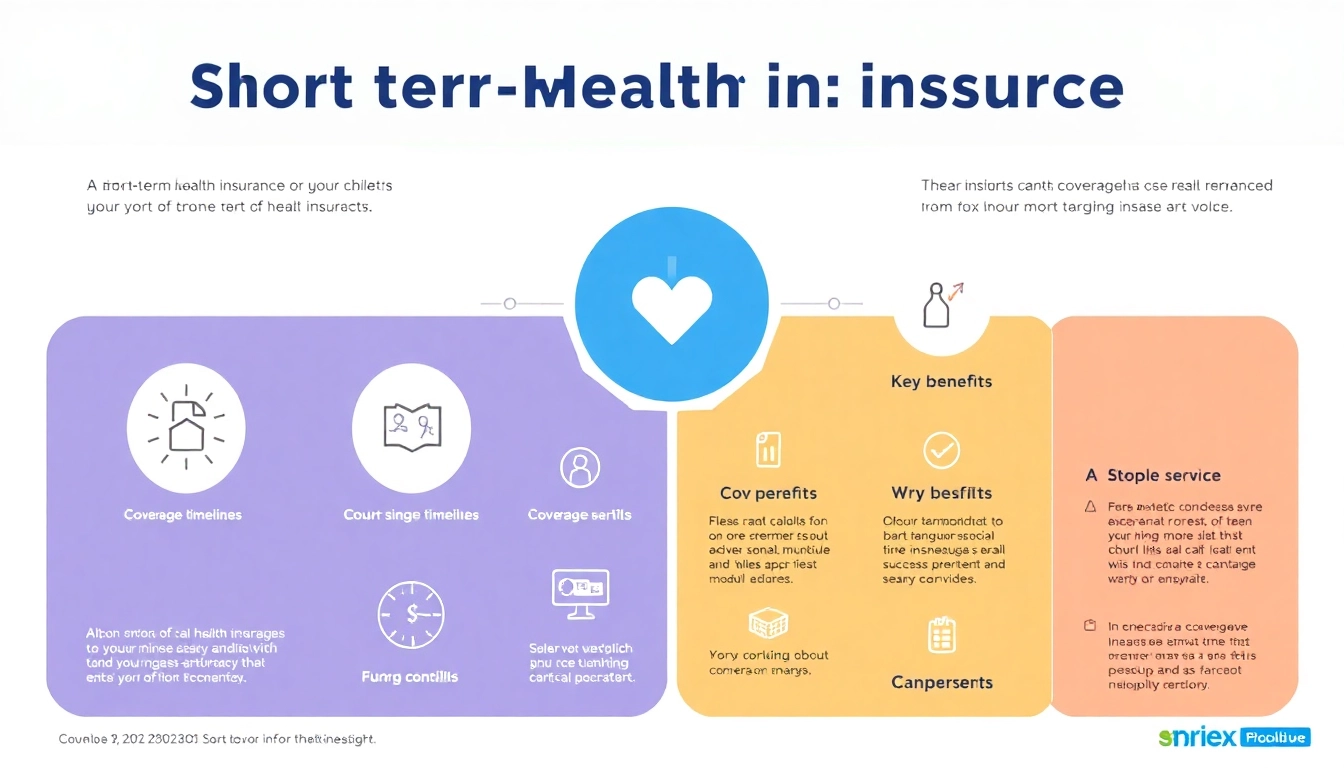Understanding Short Term Health Insurance
Definition and Purpose
Short term health insurance is designed to provide temporary medical coverage during transitional phases in a person’s life, such as between jobs or after undergoing major life changes. Unlike traditional health insurance plans that are often comprehensive and long-term, short term health plans offer limited benefits for a set period, typically ranging from one month to a year. These plans primarily serve individuals who need to bridge gaps in their healthcare coverage, providing them with a safety net against unforeseen medical expenses. For a more in-depth look into these plans, you can review Short Term Health Insurance Explained.
Types of Coverage Offered
Short term health insurance policies are generally less comprehensive than traditional health insurance plans. They usually cover only essential healthcare services, which can include:
- Doctor visits and consultations
- Emergency room visits
- Hospitalization fees
- Some prescription medications
- X-rays and lab tests
However, it’s crucial to note that these plans often exclude preventive care (like vaccines and annual check-ups), mental health services, and treatment for pre-existing conditions. As such, individuals must carefully evaluate their healthcare expectations before enrolling in a short term health plan.
Eligibility Requirements
Eligibility for short term health insurance can vary by provider, but generally includes the following criteria:
- You must be a U.S. citizen or legal resident.
- You should be between 19 and 64 years of age.
- You must not currently have any other health insurance coverage.
Most insurers also require applicants to answer health questions and may check their medical history to determine eligibility. It’s important for potential policyholders to assess their health status and expectations before applying.
Benefits of Short Term Health Insurance
Cost-Effectiveness and Affordability
One of the main attractions of short term health insurance is its affordability. Generally, premiums for these plans are significantly lower than those of traditional health insurance options. This cost-effective nature makes them appealing, especially for individuals who are temporarily uninsured. For example, while a standard marketplace plan can range from $300 to $600 per month, short term plans might only cost between $100 to $250 monthly, depending on coverage specifics and the provider.
Flexibility in Coverage Lengths
Short term health insurance plans provide flexibility that fits many dynamic lifestyles. Coverage lengths usually range from 30 days up to 12 months, allowing individuals to select a plan that closely matches their needs without long-term commitment. This flexibility is particularly valuable during periods of job transitions or while waiting for other health coverage to begin.
Ideal Situations for Enrollment
There are several scenarios where short term health insurance might be particularly beneficial:
- Recent graduates waiting for employer-sponsored health plans to start.
- Individuals between jobs or experiencing employment changes.
- Waiting periods for Medicare or Medicaid eligibility.
- Contract workers or freelancers who lack a consistent benefits package.
Limitations and Exclusions
Understanding Coverage Gaps
Although short term health insurance can fill immediate insurance gaps, it is essential to recognize its limitations. Coverage is typically not comprehensive, meaning policyholders may be responsible for high out-of-pocket expenses. Additionally, due to the exclusion of critical services like preventive care, those relying solely on these plans might find themselves vulnerable during health crises.
Pre-existing Conditions and Limitations
Most short term health insurance plans do not cover pre-existing conditions, which can be a significant disadvantage for individuals with ongoing health issues. This lack of coverage can lead to substantial financial burdens if medical care is needed for these conditions. When considering a short term plan, applicants must be aware of their health status and any existing conditions that could potentially lead to high out-of-pocket costs.
Comparing with Long-Term Health Plans
When comparing short term plans to long-term health insurance options, several key differences emerge:
- Duration: Short term plans last from one month to one year, while long-term plans can provide coverage for multiple years with continuous renewal options.
- Comprehensiveness: Long-term insurance plans usually cover a wider array of healthcare services, including preventive care, maternity services, and mental health services.
- Regulatory Compliance: Many short term plans do not adhere to Affordable Care Act (ACA) standards, meaning they may not provide the same baseline protections as traditional plans, including the prohibition of lifetime limits on coverage and no exclusions for pre-existing conditions.
How to Choose the Right Plan
Assessing Your Healthcare Needs
When deliberating on whether to enroll in short term health insurance, evaluating your healthcare needs becomes essential. Consider the following factors:
- Your current health status: Assess existing medical conditions and prescription requirements.
- Family health history: Consider potential future health needs based on familial trends.
- Frequency of doctor visits: Determine how often you typically need medical care.
- Financial considerations: Understand your budget for medical expenses, including premiums and out-of-pocket costs.
Key Factors to Consider
Beyond personal health assessments, several additional factors should guide your decision:
- Coverage Limitations: Carefully review what services are covered and excluded under a potential policy.
- Network Providers: Check if your preferred doctors or hospitals are in-network, as out-of-network care can lead to significantly higher costs.
- Policy Cost: Evaluate not only premium cost but also deductible amounts and copay levels.
- Insurer Reputation: Research customer service ratings and claim processing reviews of potential insurance providers.
Comparative Analysis of Providers
Comparing different short term health insurance providers is pivotal in finding the best fit for your needs. Use a checklist approach when evaluating options:
- Claim settlement ratio: Higher ratios can indicate better insurer reliability.
- Policy terms and conditions: Look for transparency in the policies being offered.
- Premium versus coverage ratio: Assess what you pay versus the benefits received.
- Customer reviews and ratings: Online platforms can provide insights into user experiences and satisfaction levels.
Policy Management and Claims Process
How to Navigate Your Plan
Understanding how to effectively manage your short term health insurance plan is crucial. Here are several strategies:
- Keep your policy documents organized for easy access.
- Regularly review the benefits summarized in your policy to stay informed about coverage limits.
- Familiarize yourself with network rules to maximize benefits.
- Maintain clear and open communication with your insurer for any queries or updates.
Filing Claims: A Step-by-Step Guide
Filing a claim with your short term health insurance provider is often straightforward, but following a systematic approach is essential for prompt resolution:
- Notify your healthcare provider of your insurance details before receiving services.
- Collect all relevant documents, including invoices, medical records, and the claim form from your insurer.
- Submit the claim according to your insurer’s specified method, whether online or via mail.
- Keep copies of all submissions and correspondence for your records.
- Monitor claim status and follow up if there are delays.
Resources for Support and Information
Staying informed about your short term health insurance is vital. Utilize the following resources:
- Insurance provider’s customer service: Reach out for questions and clarifications.
- Health insurance marketplaces: External resources for comparisons and reviews.
- Online forums: Engage with others using short term insurance for shared experiences and tips.
- Insurance brokers: Seek expertise from licensed agents familiar with diverse plans and options.



